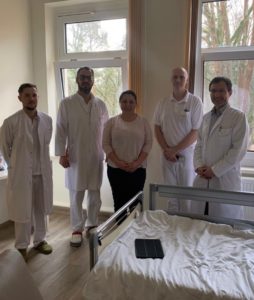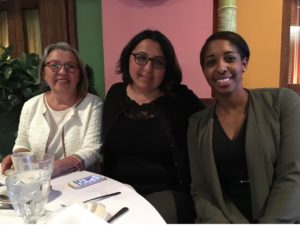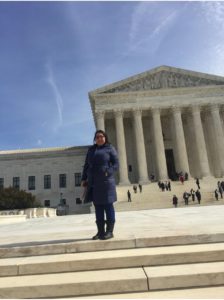In Part 1 of our interview, we discussed Katharina’s story, her diagnostic journey to Adult-Onset Still’s Disease, and why she was driven to found Perrarus. For Part 2, we will go into more details about her Relapsing Polychondritis diagnosis, advocacy work, and the changes she hopes Perrarus will bring to the rare disease sphere.
Learning to Live with this New Diagnosis
Katharina and her mother returned to D.C., where Katharina was quickly able to find Dr. Berhanu, a rheumatologist, to work with. She confirmed the AOSD diagnosis and told Katharina that she would help send her to any research studies at NIH that she matched. There was only one in the United States, so Katharina decided to look up research studies in Israel, Belgium, France, Germany, and China. She explains:
“I messaged everyone to say that I had just been diagnosed with Still’s disease and that I was wondering if they were accepting any patients. Were they coming up with any new treatment patterns?”
Dr. Eugen Feist, from Germany, responded that his research team at Charité Hospital in Berlin was taking on international patients. Meanwhile, her condition declined to the point where she couldn’t speak properly. Her brother arranged a trip for her and their mother. He has been supporting her both financially and emotionally ever since.
When she made it to Germany in December 2018, she remained solely on methotrexate – costing €300 for six weeks of treatment, compared to up to $1600/injection per week in the United States. She also made a plan with Dr. Feist to revisit Germany every three months to help manage her condition. Over the next few months, her condition improved. She was able to more easily manage her symptoms and even lower her medication doses. When Dr. Feist moved facilities, Katharina followed him. Helios Fachklinik in Vogelsang-Gommern is the new facility was designed with research, physical health, and mental health in mind. She jokes:
“People asked me, ‘Oh, you don’t have any rheumatologists in the U.S.?” Of course, we do, but not Dr. Feist.”
Her travel plans got somewhat interrupted during the onset of COVID-19, though she was still able to visit Germany for treatment in January 2020. In February 2020, she was even able to stop treatment. She explains:
“The doctors told me that Still’s can go into remission. If we’re lucky, that was it. You’ve had it for two or three years and it’s well-managed.”
But by August 2020, it became clear that something else was lurking on the horizon.
An Additional Diagnosis
Katharina and her mother had been quarantining in Washington, D.C. during the COVID-19 pandemic. In August 2020, her brother was able to visit from Turkey. The pair went for a walk in the park, shared headphones, listened to music, and just enjoyed the day. But just a few hours later, Katharina explains:
“I had a ton of pain in my right ear, and was also experiencing some rashes. The pain kept getting worse even after I took allergy medicine. When I went to a clinic, I was given antibiotics and ear drops for an ear infection. But days later, the pain got worse. I couldn’t hear in my right ear, and then I couldn’t hear in my left ear. But the emergency room just gave me more medicine for an ear infection.”
As everything worsened, Katharina’s mom told her to send a photo to Dr. Feist, who told her to visit an ENT. When the ENT determined it was not an infection, Dr. Feist proposed the idea that it could be relapsing polychondritis. After doing some research, Katharina was able to speak to the specialist at NIH: Dr. Marcela Ferrada.
She shares:
“I remember this vividly. It was a Sunday in October. I rarely cry. I try to look at life in a positive way. When the specialist called me, I told her that I’m afraid to have this. She told me that she thought my doctors were correct, and I just broke down. With my first diagnosis, my acceptance was very quick. The second one kind of crushed me.”
Katharina found some comfort in the fact that the specialist also had relapsing polychondritis. Within six weeks, Katharina and the specialist met to confirm the diagnosis. Katharina explains that it was:
“The first time any of my doctors had ever seen a patient who had both AOSD and relapsing polychondritis.”
However, to receive the COVID-19 vaccinations, Katharina was not allowed to receive treatment. So she had to get the vaccines, then wait until August 2021 to get back on prednisone and methotrexate.
About Relapsing Polychondritis
Relapsing polychondritis is a rare degenerative disease that causes inflammation of cartilage and other bodily tissues. Doctors are not sure of the exact cause of relapsing polychondritis. However, many consider it to be an autoimmune disorder, in which the immune system mistakenly attacks its own body – in this case, cartilage. The consistent inflammation associated with relapsing polychondritis causes cartilage to deteriorate. Symptoms can include:
- Joint pain, which may occur with or without arthritis
- Ear pain, swelling, or tenderness
- Middle or inner ear inflammation
- Nausea and vomiting
- Nasal cartilage inflammation, which may cause stuffiness, crusting, saddle nose deformities, or nose bleeds
- Dizziness
- Ataxia
- Impaired hearing
- Episcleritis, uveitis, or scleritis
- “Floppiness” of the ears, larynx, or trachea
- Coughing or wheezing
- Hoarseness
- Frequent or recurrent infections
Developing Perrarus
The idea for Perrarus had come to Katharina in 2019 – after her AOSD diagnosis, but before learning about her relapsing polychondritis. Initially, she had approached a friend about the possibility of starting a foundation. Her friend offered some funds and introduced her to a few law firms that agreed to do pro bono hours. After speaking with one of the firms, Katharina explains:
“The partner said to me, ‘I have never in my life seen someone who takes such a negative situation and turns it into a positive.’”
After some talking, the lawyers recommended that Katharina started a brand with a purpose rather than a foundation. While the goal is to eventually begin the Perrarus Foundation for Rare Disease Research, starting the business first will allow Perrarus to get established. She chose the name because she wanted to do something referring to rare, but in a more multicultural form.
Currently, Perrarus is registered in the United Kingdom, European Union, and United States. Bri Luginbill, a talented illustrator from Michigan who also has a rare disease and her five year old son, helped Katharina to create the images found on Perrarus merch. These cute animal images are meant to uplift your day – while contributing to the rare disease community. Ultimately, Katharina says:
“NIH funding is very limited for rare disease research. My goal is to establish a sustainable, long-term business that will help the rare disease community by investing in research. This could be aiding specific departments within hospitals or even providing fellowships to medical students who are willing to research rare diseases.”
So far, the results have been promising – Katharina has been able to sell a number of products from the website and begin raising funding and awareness for rare disease research. She hopes to receive feedback from the rare disease community about Perrarus. So if you have any recommendations, suggestions, or anything else you’d like to see, please let Katharina know. She wants to learn from your lived experience. Further, she says:
“If anyone has any organizations or fellowship programs that could benefit from this, I want to know.”
Advocacy and Involvement
Right now, Katharina is dealing with some pretty intense symptoms. She explains that:
“This is one of the worst times I have experienced. I did my chemo on Sunday but still have a lot of pain in my ear. Right now, I cannot have any more chemotherapy, so I’m taking prednisone and ibuprofen where I can. It isn’t very calming but I’m thankful that I’m able to go to Germany, see my doctors, and look for other treatments now.”
However, even her symptoms do not stop Katharina from getting involved. When she is able to, she attends events for the Rare Disease Legislative Advocates (RDLA) and the EveryLife Foundation for Rare Diseases. These allow her to keep in touch with more patients, advocates, and caregivers. She attended the EveryLife Foundation event for Rare Disease Month in 2018 and hopes to continue assisting them in the future, particularly in terms of legislative asks and policy changes.
Through Perrarus, and her own connections, Katharina also continues to advocate for patients. First, she offers advice to people who do not have a rare disease or chronic illness:
“When you unintentionally give an opinion about our condition, like ‘At least you don’t have cancer,’ it doesn’t really help. People think that they are helping, but they don’t realize how harmful those statements can be. One thing people always say to me is, ‘Oh, you’re resting all day. I wish I could do that.’ My response, every time, is that I wish I could work like a normal person.”
In the face of these challenges, Katharina also advocates for patients to take things a day at a time and not to focus on external opinions. She shares:
“Don’t blame yourself; be kind to yourself. Advocate for yourself. Stand up for yourself, whether it is your mom, dad, sibling, doctor, spouse. My husband decided not to walk this road with me. Don’t blame yourself for other people leaving because it is not your fault. Be gentle with yourself. If anyone else is upsetting you, you don’t have to talk to them. If you don’t like your doctor, leave. Find someone else. It’s your life, you don’t have to educate other people if you don’t want to. If I want to stay in bed all day, I’ll do it without guilt, because I can and because I need the rest and because I’ll wake up tomorrow feeling better.”
She also explains that finding an activity that patients can do – that works within their abilities – can help bring some comfort and relief to their lives. For Katharina, this is writing; for someone else, it might be painting or reading. Either way, find what works best for you.
Katharina is willing to speak with anybody who has any questions on Adult-Onset Still’s Disease, relapsing polychondritis, or starting your own brand. Please feel free to contact Patient Worthy to facilitate that connection.









